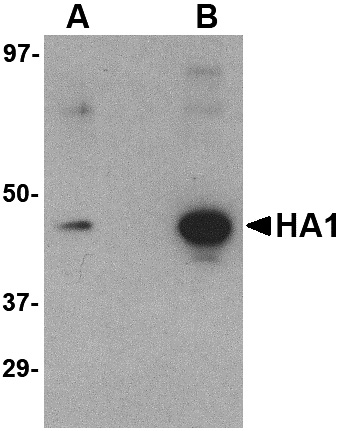HA Mouse Monoclonal Antibody [Clone ID: 1E6A7]
Other products for "HA"
Specifications
| Product Data | |
| Clone Name | 1E6A7 |
| Applications | WB |
| Recommended Dilution | ELISA, WB: 1 ug/mL |
| Reactivities | Influenza A Virus |
| Host | Mouse |
| Clonality | Monoclonal |
| Immunogen | A peptide corresponding to 13 amino acids in the middle of the Hemagglutinin protein. |
| Formulation | PBS containing 0.02% sodium azide. |
| Concentration | 1 mg/ml |
| Purification | Purified from mouse ascites fluids or tissue culture supernatant by affinity chromatography (protein A/G) |
| Conjugation | Unconjugated |
| Storage | Store at -20°C as received. |
| Stability | Stable for 12 months from date of receipt. |
| Background | Hemagglutinin Monoclonal Antibody: Influenza A virus is a major public health threat, killing more than 30,000 people per year in the USA. Novel influenza virus strains caused by genetic drift and viral recombination emerge periodically to which humans have little or no immunity, resulting in devastating pandemics. Influenza A can exist in a variety of animals; however it is in birds that all subtypes can be found. These subtypes are classified based on the combination of the virus coat glycoproteins hemagglutinin (HA) and neuraminidase (NA) subtypes. During 1997, an H5N1 avian influenza virus was determined to be the cause of death in 6 of 18 infected patients in Hong Kong. The more recent virulent strain of H5N1 is now seen in Africa and Europe, as well as in southeast Asia. There is some evidence of human to human spread of this virus, but it is thought that the transmission efficiency was fairly low. HA interacts with cell surface proteins containing oligosaccharides with terminal sialyl residues. Virus isolated from a human infected with the H5N1 strain in 1997 could bind to oligosaccharides from human as well as avian sources, indicating its species-jumping ability. While efforts were made to use relatively conserved regions of the viral sequence as the antigen, the influenza virus genome has drifted somewhat from what was first reported. However, this antibody was able to recognize peptides derrived from viruses from Indonesian human patients infected in 2007. |
| Reference Data | |
Documents
| Product Manuals |
| FAQs |
| SDS |
{0} Product Review(s)
0 Product Review(s)
Submit review
Be the first one to submit a review
Product Citations
*Delivery time may vary from web posted schedule. Occasional delays may occur due to unforeseen
complexities in the preparation of your product. International customers may expect an additional 1-2 weeks
in shipping.






























































































































































































































































 Germany
Germany
 Japan
Japan
 United Kingdom
United Kingdom
 China
China



